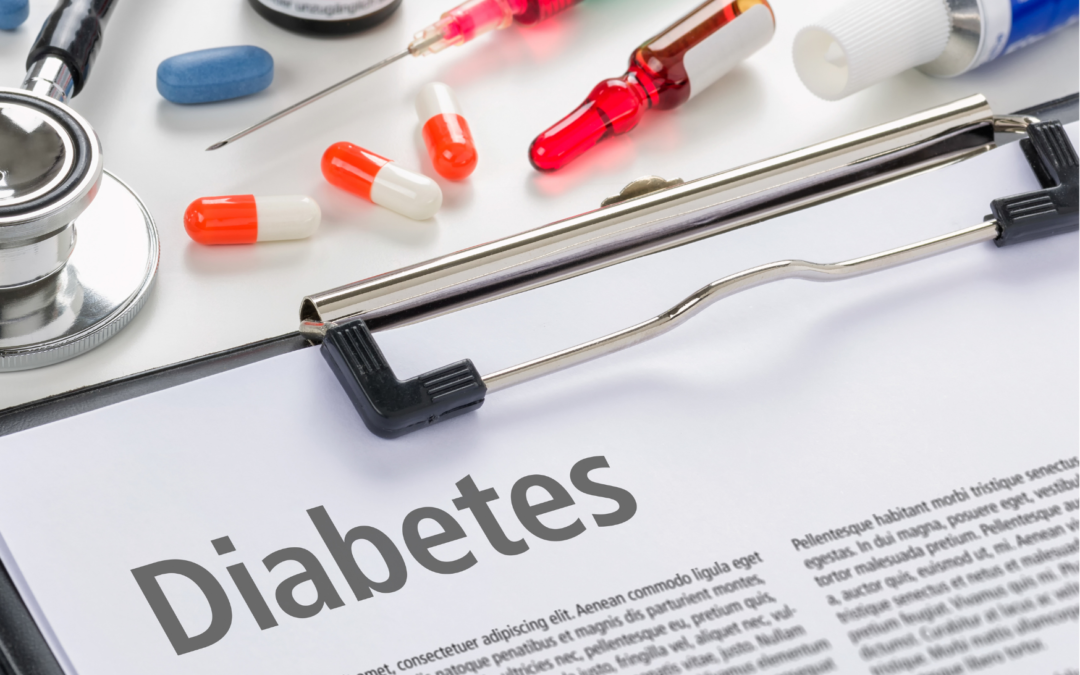Diabetes is a condition which causes a person’s blood glucose (sugar) levels to become high. The hormone insulin moves glucose from the blood to your cells and when someone is diabetic, it’s either because the body doesn’t make enough insulin or isn’t able to use insulin effectively. The cells use glucose to produce energy and the body’s glucose level must be maintained within a certain range for many functions to take place normally.
There are different types of diabetes and some of the main ones are;
- Type 1 is an autoimmune disease where the body’s immune cells attack the insulin producing cells causing a lack of insulin.
- Type 2 diabetes is more common where the cells become resistant to the insulin and this prevent cells from absorbing glucose to use.
- In both these cases, the amount of glucose remains high in the blood.
- Pre diabetes is when your blood glucose is higher than normal but not high enough to be classified as diabetic.
Some of the common symptoms of diabetes are constantly feeling hungry and thirsty, increased urination, blurry vision and fatigue.
Getting diagnosed with diabetes is worrying especially as it is associated with an increase in the risk of other diseases and complications, like cardiovascular disease, kidney disease, nerve damage, and infections of the skin where sores develop and do not heal properly.
I want to discuss Type 2 diabetes as the risk of getting this increases when someone is overweight and obese. It can be helped by making changes to diet and lifestyle.
In today’s article, I wanted to share my client Meeta’s story. She contacted me when she was diagnosed as being diabetic in March 2021, as her blood glucose level was 50 mmol/mol (diabetic). Her GP had advised her to change her diet and lifestyle in 6 months, which is when she arranged a free discovery call to improve her health naturally.
The blood sugar range as per Diabetes.co.uk website is:
Normal: Below 42 mmol/mol
Prediabetes: 42 to 47 mmol/mol
Diabetes: 48 mmol/mol
By September 2021, her blood glucose came down to 41 mmol, which was within the normal range and she had successfully in 6 months managed to reverse her diabetes.
She did this by eating clean, getting active and losing 8 kg of weight. Her GP was happy with her results and I’m pleased to say, that Meeta is still continuing on her wellness journey as enjoys her new way of eating and living.
She’s a busy woman, who works and looks after her family and she wanted to be able to fit getting healthy into a tight schedule. Her main issue when she contacted me was how to find the time to exercise and cook. And this is what I guided her to do, including how to get organised and schedule activities and meal preparation.
Meeta’s knowledge about nutrition in daily food increased tremendously which also changed her food shopping habits. As she said “I am now fitter and healthier and glad that I contacted Sujata and learned a lot which I continue to follow all the time.”
Let me share what Meeta did to reverse her diabetes in six months:
- Got active by walking daily and this built her fitness gradually.
- After consistently walking daily, she then started to exercise at home which was convenient for her.
- She increased vegetables as these are nutrient dense and good source of fibre.
- Meeta is vegetarian so she learnt the best protein options in my program.
- She learnt which are the best whole grains to eat and how to control portion sizes.
- She tried new recipes and became creative in the kitchen.
- She went to restaurants and enjoyed herself.
She managed to do this because she prioritised herself and her self-care.
If I was to say what sets Meeta aside, it is her determination to improve her health by learning what to do and taking control of her health. She is patient, and did not give up when the scales didn’t shift. She understands that this is not a short term quick-fix but a long term way of living a healthier and happier life.
I’m often contacted by those who want to improve their lives and the main thing I ask is how important are your goals? Because only when it is a priority, can you do something about it and make the changes needed. If it’s not a priority, you will have many reasons or excuses, like being busy, not having enough time or that it isn’t the right time.
Your health should be your first priority, so don’t put aside what is with you for your lifetime.
Arrange a FREE Discovery Call
If you would like to get started on making changes, get in touch with me as I offer a free discovery call. This is what you need to do:
I look forward to speaking with you soon.
